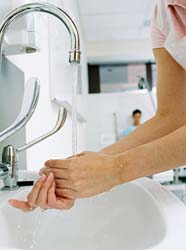Good practices help
prevent SuperBug
By Whitney Keyes
'Tis the
season for coughing, sneezing and those nasty cuts from the Christmas
tree. And
that's a just the beginning of the sickness. Carelessness this season
could
result in contracting what health care workers call "SuperBug."
Superbugs
are germs or infections that are resistant to the normal antibiotics
used to
treat common illnesses. These superbugs are becoming more and more
common now,
with the abundance of antibiotics being used to treat everything from a
cold,
to the flu, to an infection. When these strains attack, the victim
could be
killed in days.
"It's
more of an awareness thing now, people are more aware, and there are a
few more
cases," said Infections control nurse at St. Francis
Hospital and Health
Services Barb Mullock.
One of the
more common superbugs is Methicillin-resistant Staphylococcus Aureus
(MRSA.) In
the past years, MRSA has been on the rise, and has extended to
affecting people
outside the health care profession.
Now,
sometimes called Community-associated MRSA (meaning non health care
workers
also contract it), anyone could contract it.
Most
victims acquire MRSA by coming into contact with an already infected
person-
through open wounds, unwashed hands and crowded living conditions.
Also, body
piercings, tattoos and locker rooms present more of a risk.
Despite the
care taken by some to prevent MRSA, it is common. It is easily treated
if
caught in time. Warning signs of MRSA can look like pimples, boils or
spider bites.
Usually, these are pus-filled.
These can
be drained, but if not caught in time can lead to pneumonia or
bloodstream
infections.
If these
are spotted, one should contact their health care provider as soon as
possible.
Even after treatment, superbugs can be contracted again.
"The
best way to protect yourself is to take care of your own immunity. That
includes good nutrition, getting enough sleep and daily health
practices,"
said Virginia Murr, director of wellness and assistant director of
health
services at the University
Health Center.
Murr's
"daily health practices" include covering any cut or wounds and good
hand washing-which is comprised of 15 seconds with hot water and soap.
Other ways
to prevent superbugs are to dry clothes in the dryer, as opposed to
air-drying.
The heat from the dryer kills more bacteria on the clothing.
Refrain
from touching personal objects such as toothbrushes, razors or shower
shoes.
Also, using alcohol-based sanitizers can eliminate some of the germs.
Lastly,
mouths should always be covered if sneezing or coughing.
However,
one of the most important measures to take when protecting oneself from
superbugs
is to follow the doctors' orders, Mullock said.
Instructions
from doctors about how much of the antibiotic to take, and for how long
should
be highly regarded.
Overuse of
antibiotics to a degree created superbugs, and under use will prolong
the
sickness.
"Superbugs
are partly because people are noncompliant. Follow the directions,"
Mullock said.
So
this season, make hand washing, mouth covering and wound protection
part of
your family holiday traditions.
|





